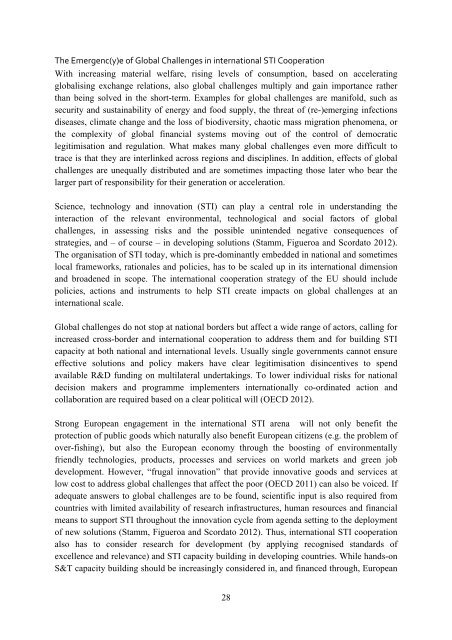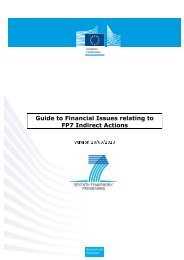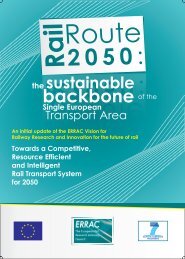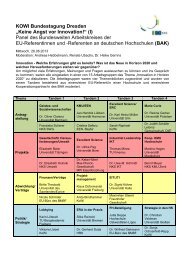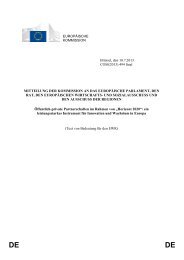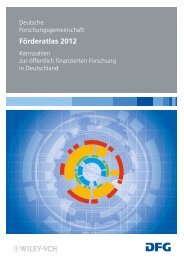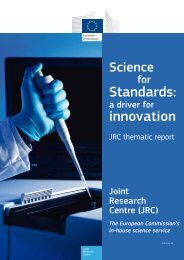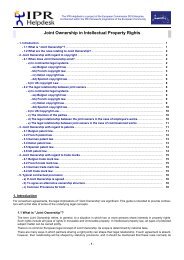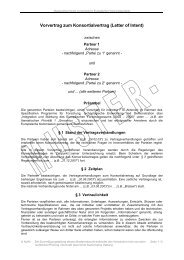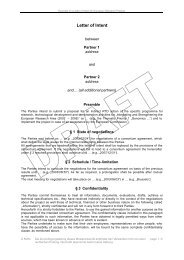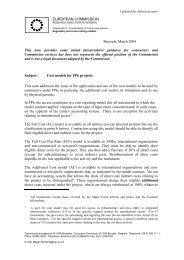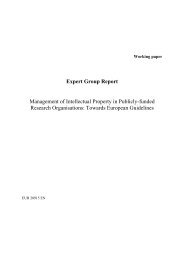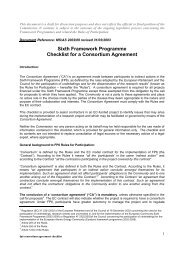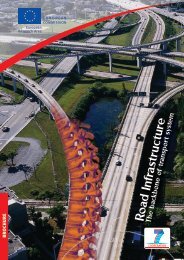Draft Report of the Expert Group on International STI Cooperation to ...
Draft Report of the Expert Group on International STI Cooperation to ...
Draft Report of the Expert Group on International STI Cooperation to ...
You also want an ePaper? Increase the reach of your titles
YUMPU automatically turns print PDFs into web optimized ePapers that Google loves.
The Emergenc(y)e <str<strong>on</strong>g>of</str<strong>on</strong>g> Global Challenges in internati<strong>on</strong>al <strong>STI</strong> Cooperati<strong>on</strong><br />
With increasing material welfare, rising levels <str<strong>on</strong>g>of</str<strong>on</strong>g> c<strong>on</strong>sumpti<strong>on</strong>, based <strong>on</strong> accelerating<br />
globalising exchange relati<strong>on</strong>s, also global challenges multiply and gain importance ra<str<strong>on</strong>g>the</str<strong>on</strong>g>r<br />
than being solved in <str<strong>on</strong>g>the</str<strong>on</strong>g> short-term. Examples for global challenges are manifold, such as<br />
security and sustainability <str<strong>on</strong>g>of</str<strong>on</strong>g> energy and food supply, <str<strong>on</strong>g>the</str<strong>on</strong>g> threat <str<strong>on</strong>g>of</str<strong>on</strong>g> (re-)emerging infecti<strong>on</strong>s<br />
diseases, climate change and <str<strong>on</strong>g>the</str<strong>on</strong>g> loss <str<strong>on</strong>g>of</str<strong>on</strong>g> biodiversity, chaotic mass migrati<strong>on</strong> phenomena, or<br />
<str<strong>on</strong>g>the</str<strong>on</strong>g> complexity <str<strong>on</strong>g>of</str<strong>on</strong>g> global financial systems moving out <str<strong>on</strong>g>of</str<strong>on</strong>g> <str<strong>on</strong>g>the</str<strong>on</strong>g> c<strong>on</strong>trol <str<strong>on</strong>g>of</str<strong>on</strong>g> democratic<br />
legitimisati<strong>on</strong> and regulati<strong>on</strong>. What makes many global challenges even more difficult <strong>to</strong><br />
trace is that <str<strong>on</strong>g>the</str<strong>on</strong>g>y are interlinked across regi<strong>on</strong>s and disciplines. In additi<strong>on</strong>, effects <str<strong>on</strong>g>of</str<strong>on</strong>g> global<br />
challenges are unequally distributed and are sometimes impacting those later who bear <str<strong>on</strong>g>the</str<strong>on</strong>g><br />
larger part <str<strong>on</strong>g>of</str<strong>on</strong>g> resp<strong>on</strong>sibility for <str<strong>on</strong>g>the</str<strong>on</strong>g>ir generati<strong>on</strong> or accelerati<strong>on</strong>.<br />
Science, technology and innovati<strong>on</strong> (<strong>STI</strong>) can play a central role in understanding <str<strong>on</strong>g>the</str<strong>on</strong>g><br />
interacti<strong>on</strong> <str<strong>on</strong>g>of</str<strong>on</strong>g> <str<strong>on</strong>g>the</str<strong>on</strong>g> relevant envir<strong>on</strong>mental, technological and social fac<strong>to</strong>rs <str<strong>on</strong>g>of</str<strong>on</strong>g> global<br />
challenges, in assessing risks and <str<strong>on</strong>g>the</str<strong>on</strong>g> possible unintended negative c<strong>on</strong>sequences <str<strong>on</strong>g>of</str<strong>on</strong>g><br />
strategies, and – <str<strong>on</strong>g>of</str<strong>on</strong>g> course – in developing soluti<strong>on</strong>s (Stamm, Figueroa and Scorda<strong>to</strong> 2012).<br />
The organisati<strong>on</strong> <str<strong>on</strong>g>of</str<strong>on</strong>g> <strong>STI</strong> <strong>to</strong>day, which is pre-dominantly embedded in nati<strong>on</strong>al and sometimes<br />
local frameworks, rati<strong>on</strong>ales and policies, has <strong>to</strong> be scaled up in its internati<strong>on</strong>al dimensi<strong>on</strong><br />
and broadened in scope. The internati<strong>on</strong>al cooperati<strong>on</strong> strategy <str<strong>on</strong>g>of</str<strong>on</strong>g> <str<strong>on</strong>g>the</str<strong>on</strong>g> EU should include<br />
policies, acti<strong>on</strong>s and instruments <strong>to</strong> help <strong>STI</strong> create impacts <strong>on</strong> global challenges at an<br />
internati<strong>on</strong>al scale.<br />
Global challenges do not s<strong>to</strong>p at nati<strong>on</strong>al borders but affect a wide range <str<strong>on</strong>g>of</str<strong>on</strong>g> ac<strong>to</strong>rs, calling for<br />
increased cross-border and internati<strong>on</strong>al cooperati<strong>on</strong> <strong>to</strong> address <str<strong>on</strong>g>the</str<strong>on</strong>g>m and for building <strong>STI</strong><br />
capacity at both nati<strong>on</strong>al and internati<strong>on</strong>al levels. Usually single governments cannot ensure<br />
effective soluti<strong>on</strong>s and policy makers have clear legitimisati<strong>on</strong> disincentives <strong>to</strong> spend<br />
available R&D funding <strong>on</strong> multilateral undertakings. To lower individual risks for nati<strong>on</strong>al<br />
decisi<strong>on</strong> makers and programme implementers internati<strong>on</strong>ally co-ordinated acti<strong>on</strong> and<br />
collaborati<strong>on</strong> are required based <strong>on</strong> a clear political will (OECD 2012).<br />
Str<strong>on</strong>g European engagement in <str<strong>on</strong>g>the</str<strong>on</strong>g> internati<strong>on</strong>al <strong>STI</strong> arena will not <strong>on</strong>ly benefit <str<strong>on</strong>g>the</str<strong>on</strong>g><br />
protecti<strong>on</strong> <str<strong>on</strong>g>of</str<strong>on</strong>g> public goods which naturally also benefit European citizens (e.g. <str<strong>on</strong>g>the</str<strong>on</strong>g> problem <str<strong>on</strong>g>of</str<strong>on</strong>g><br />
over-fishing), but also <str<strong>on</strong>g>the</str<strong>on</strong>g> European ec<strong>on</strong>omy through <str<strong>on</strong>g>the</str<strong>on</strong>g> boosting <str<strong>on</strong>g>of</str<strong>on</strong>g> envir<strong>on</strong>mentally<br />
friendly technologies, products, processes and services <strong>on</strong> world markets and green job<br />
development. However, “frugal innovati<strong>on</strong>” that provide innovative goods and services at<br />
low cost <strong>to</strong> address global challenges that affect <str<strong>on</strong>g>the</str<strong>on</strong>g> poor (OECD 2011) can also be voiced. If<br />
adequate answers <strong>to</strong> global challenges are <strong>to</strong> be found, scientific input is also required from<br />
countries with limited availability <str<strong>on</strong>g>of</str<strong>on</strong>g> research infrastructures, human resources and financial<br />
means <strong>to</strong> support <strong>STI</strong> throughout <str<strong>on</strong>g>the</str<strong>on</strong>g> innovati<strong>on</strong> cycle from agenda setting <strong>to</strong> <str<strong>on</strong>g>the</str<strong>on</strong>g> deployment<br />
<str<strong>on</strong>g>of</str<strong>on</strong>g> new soluti<strong>on</strong>s (Stamm, Figueroa and Scorda<strong>to</strong> 2012). Thus, internati<strong>on</strong>al <strong>STI</strong> cooperati<strong>on</strong><br />
also has <strong>to</strong> c<strong>on</strong>sider research for development (by applying recognised standards <str<strong>on</strong>g>of</str<strong>on</strong>g><br />
excellence and relevance) and <strong>STI</strong> capacity building in developing countries. While hands-<strong>on</strong><br />
S&T capacity building should be increasingly c<strong>on</strong>sidered in, and financed through, European<br />
28


